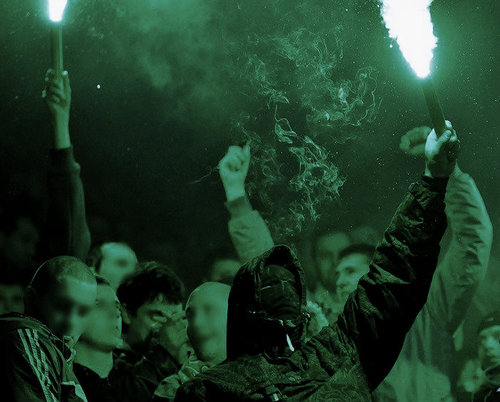As Celtic prepare to face Milan in the Champions League, a team from a nation synonymous with fan culture, it is worth reflecting on an ever increasing phenomenon that is seeping through Scottish football like an unwanted bruise – the use of pyro at matches.
The Italian notion of ultra is a complex issue. Milan were the first team to have an established group, the Fossa dei Leoni, which began in 1968. The group rose from being a small collective of supportive with its own section at the stadium, to being a fully organised, deeply political movement with an unelected structure. Leaders emerged, rather than being elected, and throughout the 70s and 80s, all major Italian teams formed their own ultras groups, with varying and interchangeable politics. Ultra fandom in Italy had travelled beyond the pale in the early part of the 20th century, with Lazio president Claudio Lotito being threatened in public by his own team’s ultras. His crime was not selling the star striker or preventing lateral movement, but he was simply trying to control merchandise sales. Up until 2004, Lazio’s shirt sales were controlled by their ultras.
Scottish football is culturally apart from Italian football. Indded, the Fossa dei Leoni disbanded one year before the Green Brigade was formed. The culture of the Italian ultra movement was subject to vast amounts of parliamentary and societal debates that centred on the ever increasing ambiguity of what ultra truly constituted. On a wider scale, debates raged over the escalating violence that rose between those who were using a support for a particular club to satisfy their own ideology. On a minor level, it is accepted in Italian culture that, in the curva, pyro is a part of the matchday experience. Furthermore, as a general rule, due to the distances between certain areas of the country, it is the hardcore fans who travel to away games. Fans that simply wish to watch the game have their own sections, and in terms of what people seek from a ninety minute match, all fan experiences are catered for.
However, in the UK the law prevents the use of pyro at matches. The Sporting Events (Control of Alcohol etc) Act 1985 states that:
It is an offence for a person to enter or attempt to enter a football ground while in possession of a flare, smoke bomb or firework. The sentence for these offences can be as much as three months in priso, and in many cases, fans who have no previous convictions are being given prison sentences for attempting to enter a football ground with a smoke bomb in their pocket as the courts take these offences very seriously.
To highlight the law in action, in February of this year, two Chelsea supporters were banned from attending matches for ten years and sent to prison for a month for possessing flares during a match against Swansea City. Opponents will immediately cry that they are against modern football, yet the law has been in place since the mid-1980s. Being banned for ten years highlights the stupidity of these actions, and raises the pivotal question about whether seeing your team prosper on the pitch means less to some supporters than playing with noisy toys.
In the aftermath of the Hearts victory, arguments persisted about the use of pyro amongst the away support. It appeared that on one side intelligent points were expressed, not least surrounding the health of those with breathing difficulties, whereas on the other side people exclaimed ‘no pyro no party’ like a herd of sheep with mushy peas for brains. In May of this year, a 15 year old Aston Villa fan was hospitalised with lung damage due to the effects of a smoke bomb. I fail to see how hospitalisation and being unable to breathe constitutes even the darkest of parties.
As fans, we all see football matches in our own way. I have friends who find it odd that I never miss a live match, and they are content to watch on TV. In turn, I find this perplexing. Neither of our actions has a direct impact upon the enjoyment of the other. With relation to the use of pyro, the selfishness of others leads to a miserable experience for the fellow supporter. Creating a positive atmosphere at an away match is a wonderful experience, with the fans united in support of their team. The use of flares and smoke bombs creates a division, and draws the attention away from the team to the fans. In this instance, the pyro itself becomes the main event, with the football a secondary event that is simply used as the mechanism for binding together the pyro obsessed.
Football should never become a sanitised event where supporters are mere consumers who should swallow the large portions of marketing and spin that football clubs feed them, but neither should it serve the gratification of the selfish. I have yet to read an argument that highlights how the use of pyro improves the fan experience. Having been next to a flare when it was thrown, it merely creates a half-baked cheer, along with a sudden movement as fans of all ages try to prevent the smoke filling their lungs. Meanwhile, the football match that has tied everyone together becomes inconsequential. Whilst some fan displays across Europe, including the 125 year anniversary one from Celtic fans are aesthetically brilliant, the use of pyro to enhance the fan experience merely highlights a rancid selfishness that needs to be eradicated from all fan bases. It only serves to enhance the sense of identity of those who seek misguided recognition and acceptance.






AYE BANG ON THE MONEY S.13,GOTTA SEE THE BIGGER PICTURE.CONSIDERING THAT`S WHAT WE PAY THE PRICE TO SEE,OUR TEAM PLAY,NOT A.N.OTHER AND HIS SELFISH MATES CAUSING UNREST AMONGST THE FAITHFUL.WELL SAID.
HH M&T
PS.I THOUGHT THE G.B. HAD GIVEN THE CLUB ASSURANCE THAT THIS WOULD NOT BE AN ISSUE.IE.THEY WOULD NO LONGER BE USING FLARES ETC.
MAYBE THEY MEANT IT WOULD NO LONGER HAPPEN IN `PARADISE`.GORGIE DISNAE COUNT
AYE BANG ON THE MONEY S.13,GOTTA SEE THE BIGGER PICTURE.CONSIDERING THAT`S WHAT WE PAY THE PRICE TO SEE,OUR TEAM PLAY,NOT A.N.OTHER AND HIS SELFISH MATES CAUSING UNREST AMONGST THE FAITHFUL.WELL SAID.
HH M&T
Spot on. Anytime I’ve debated this on twitter with the few who support, it comes down to “Because I like doing it so stuff you”. A more blatant and extreme Thatcherite opinion you wouldn’t even get from Norman Tebbit.